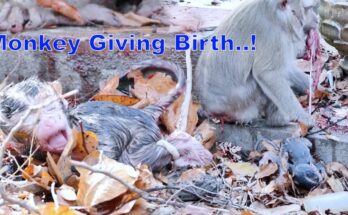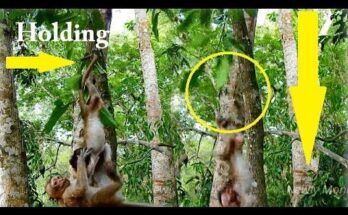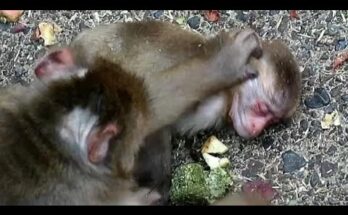The sun was slipping behind the treeline when the little troop moved through the clearing, their chatter a soft, nervous hum. Daniela, still small and wide-eyed, clung to the edge of the group, curious but cautious. Dee Dee — bigger, bolder, and known to everyone as the one who pushed boundaries — lounged on a low branch, watching with a restless energy that made the others give him space. Nobody expected the afternoon to turn harsh, but in one quick, reckless moment things changed.
It began as a shove: a careless test of strength or a clumsy game. Dee Dee lunged at the younger monkey, and Daniela stumbled backward. For a heartbeat it looked like normal roughhousing — the kind that happens when young animals learn limits — but Dee Dee didn’t stop. He grabbed, hauled, and dragged Daniela toward an old tree at the edge of the clearing. The smaller monkey scrambled, arms flailing, eyes wide with panic. The troop fell silent as the scene unfolded.
When Daniela struck the trunk, the impact echoed like a crack. She collapsed against the bark, breath hitching, tiny body trembling. For all her confusion and fear, she tried to rise, but her legs shook and her face was pale. The others rushed forward — a scatter of anxious faces and hesitant steps. Some circled protectively, others cried out in sharp, outraged calls. Dee Dee stood a little way off, chest heaving, as if only then realizing how far he’d gone. Pride and guilt warred in his posture; he glanced at Daniela, then at the troop, searching for an excuse that wouldn’t come.
A gentle hand — the older female Bina, motherly and steady — reached for Daniela. She cradled the small monkey in a practiced grip, murmuring low soothing sounds that had calmed many in the troop before. Another pushed Dee Dee back, her voice a clear reprimand. Dee Dee’s ears drooped; he looked smaller suddenly, as if the weight of what he’d done pressed him down. There was anger in the air but it was matched by a fiercer instinct to heal. Scratches and bruises are part of troop life, but cruelty is not, and the group moved quickly to restore balance.
Daniela’s breathing slowed under Bina’s warmth. Tears streaked down her cheeks — not from pain alone, but from the shock of betrayal, the hurt of being treated roughly by one she had thought a playmate. The troop surrounded her in a protective ring, shoulders and tails braided in silent solidarity. Dee Dee hung back, head lowered, ashamed. A few elders approached him slowly, not to punish with violence but to teach with presence. They tapped his shoulder and chattered in low, corrective tones that made clear the troop’s code: strength is to protect, not to dominate.
As dusk rolled in, the atmosphere softened. Daniela, though shaken, began to sip water and nibble on leaves offered by a kind troop member. Dee Dee sat apart and watched, fingers nervously plucking at the grass. It would take time — time, apologies, small brave acts to prove he’d learned — before trust could be rebuilt. But for now, the troop’s care held Daniela safe, and that protective circle, quiet but resolute, was the first step toward healing.
In the aftermath, the clearing felt different: scarred by one harsh moment but softened by the troop’s response. Hurt had been done, yes, but so had kindness. The lesson was simple and old: power must be tempered by compassion, and a community’s strength is measured most by how it cares for its weakest.


